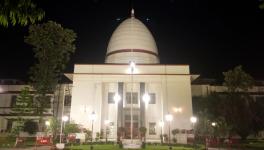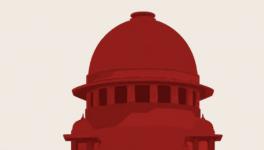SC's Suspension of Dr. G.N. Saibaba’s Acquittal: ‘Technical Grounds are also Substantive’, says Senior Advocate, Mihir Desai

ON October 25, the human rights body, People’s Union for Civil Liberties (‘PUCL’) hosted a webinar on the effect of three recent judgments: Jyoti Japtap versus NIA (in which the Bombay High Court denied bail to activist and performer Jyoti Japtap, detained as an accused in the Bhima Koregaon case), State of Maharashtra versus Mahesh Kariman Tirki & Ors. (in which the Supreme Court stayed the acquittal by the Bombay high court of scholar, writer and activist Dr. G.N Saibaba’s conviction in a Maoist links case), and Umar Khalid versus State of NCT of Delhi (in which the Delhi High Court denied bail to activist Umar Khalid, detained as an accused in the Delhi riots case).
All three accused persons are charged under the draconian anti-terror law, the Unlawful Activities (Prevention) Act, 1967 (‘UAPA’).
The discussion was moderated by the General Secretary of the PUCL, Dr. V. Suresh. Speakers included senior advocate Mihir Desai, and author and legal scholar Gautam Bhatia.
Desai, while speaking on Dr. Saibaba’s case, said, “It needs to be understood that technical grounds are also very substantive grounds. They are not just procedural grounds. They go into the root of the matter.”
He was speaking in reference to the Supreme Court suspending the acquittal of Dr. Saibaba because the Bombay high court had released him on technical grounds.
The high court used the absence of sanction – a technical ground – as a “shortcut” to give relief to Dr. Saibaba, the Supreme Court had suggested.
Desai pointed out that the jurisprudence of anti-detention laws developed in the last 50 years suggests that people are let out essentially on procedural grounds because it pertains to personal liberty. Procedural grounds have an equal value to that of substantive grounds in the matter of personal liberty, he told the audience.
Speaking on Japtap’s case, Desai said that the Union Government is randomly calling certain organisations as frontal and therefore alleging that they are a part of a Maoist group.
Japtap was alleged to be a part of the Kabir Kala March (‘KKM’), a cultural organisation which the Union Government claimed was a frontal organisation of the banned terrorist outfit, the Communist Party of India (Maoist), without any formal notification. KKM is still not banned, but the court allowed the Union Government to submit an affidavit on the same.
It is not expected from judges to accept such arguments, Desai added.
Desai explained that no person can be charged under the UAPA without the prior sanction of the Union or state government. However, no sanction was admittedly taken in Dr. Saibaba’s case before taking cognisance, he suggested.
Further, under the UAPA, the government has to refer the prima facie allegation of unlawful association to a tribunal, usually made up of a retired judge. The tribunal has to submit a report on whether a prima facie case is made.
Desai pointed out that the Union Government took cognisance against the accused persons in the Bhima Koregaon violence case despite the fact that the report submitted by the tribunal did not state reasons for their alleged association.
Courts are giving conspiracy angle to fill gaps: Bhatia
In Asif Iqbal Tanha versus State of NCT of Delhi (2021), the Delhi high court granted bail on merits despite working within the confines of the UAPA and the Supreme Court’s judgment in NIA versus Zahoor Ahmad Shah Watali (2019), and crafted doctrines and remedies that would allow the grant of bail. In Iqbal Ahmed Kabir Ahmed versus The State of Maharashtra (2021) (‘Iqbal’), the accused was granted bail by the Bombay high court on the ground of prolonged incarceration, which infringes his right to life and personal liberty.
Bhatia said that it is not true that the UAPA text, read with the Supreme Court’s judgment in Zahoor Ahmad Shah Watali, has tied the hands of lower courts in terms of exercising their discretion in bail petitions.
The two judgments (Asif Iqbal Tanha and Iqbal Ahmad Kabir Ahmed), Bhatia stated, establish two doctrinal propositions consistent with UAPA and Zahoor Ahmad Shah Watali. First, the substantive clauses of the UAPA are to be given narrow and restricted meanings. Second, the allegations in the charge sheet must be individualised, factual and particularly restricted, Bhatia explained.
However, there is a reversal of these two principles in Khalid’s recent bail decision, Bhatia pointed out. There has been a broad reading of the substantive clauses of the UAPA such as what constitutes terrorism; besides, the link between the events that took place and the offence was drawn in a loose manner, he suggested.
Bhatia said that courts are filling the gaps between what the individual is accused of and the offence with inferences and assumptions to create a chain that triggers the invocation of Section 43(D)(5) of the UAPA. In the Bhima Koregaon violence case, no actual allegation exists against Japtap. However, the gaps have been filled by the court to construct the larger conspiracy angle, Bhatia stated. Similarly, in Khalid’s case, there are various innocuous speeches that have been given sinister meaning to give a conspiracy angle to it by the court, Bhatia noted.
“The speeches are used to establish conspiracy. Conspiracy is used to give speeches of the criminal colour”, Bhatia suggested.
The PUCL claimed that the Union Government decides for itself without consulting the state government to allow the National Investigation Agency (‘NIA’) to take over a particular case. For instance, on Tuesday, the NIA took over a probe initiated by the Tamil Nadu police over a car blast in Coimbatore, in which explosives were found, the PUCL pointed out. It is not clear, however, whether the Tamil Nadu Government’s recommendation to transfer the investigation of the case to the NIA, became inevitable following the registration of the UAPA case against the accused.
Statistics, the PUCL claimed, reveal that if it is an opposition-ruled state, the Union Government usually takes over the probe. The data also found abysmal bail figures. Only 17 per cent of those accused in UAPA cases get bail, and the rest end up in jail till the end of their trial.
Get the latest reports & analysis with people's perspective on Protests, movements & deep analytical videos, discussions of the current affairs in your Telegram app. Subscribe to NewsClick's Telegram channel & get Real-Time updates on stories, as they get published on our website.





















